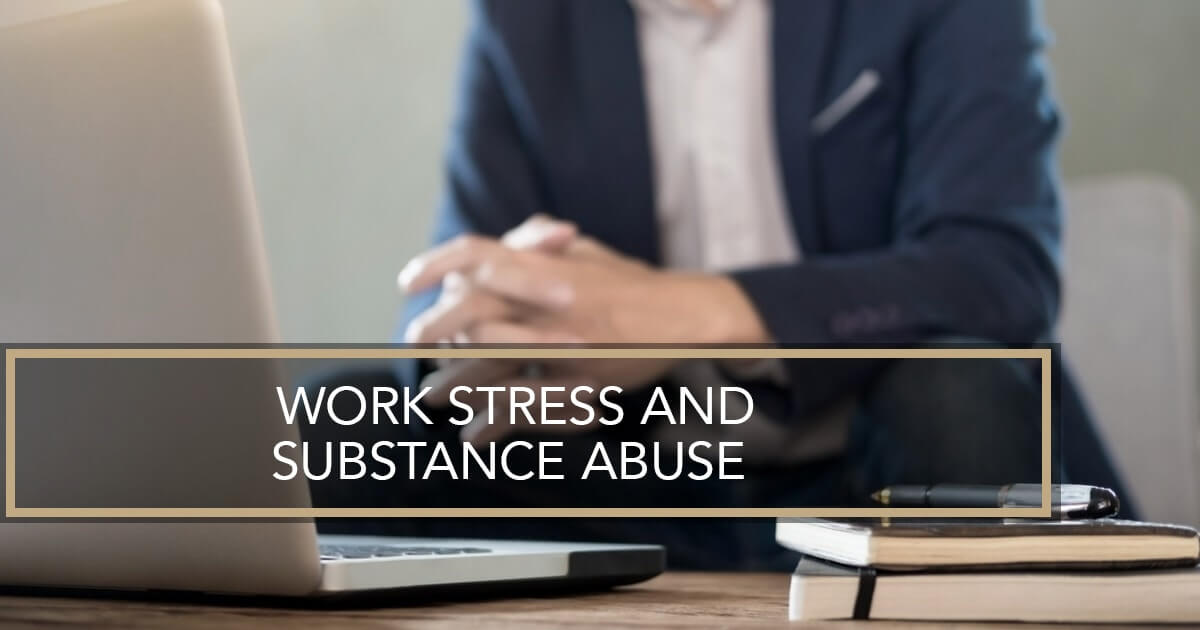Many believe that people with substance abuse problems aren’t able to hold down jobs, but substance abuse statistics show that this is a false statement. An estimated 70% of the more than 14.8 million people who use illegal drugs work at least part-time, and nearly a quarter of all respondents to a survey reported having drunk at least once on the job during the previous 12 months. Not only are many people with substance use disorders employed, but work stress may contribute to their drug or alcohol abuse. Read on to learn more about the connection between work stress and substance abuse.
Substance Abuse in the Workplace
Substance abuse in the workplace may go undetected for long periods. People with unhealthy coping mechanisms who frequently use alcohol or drugs to deal with mental health concerns like depression and anxiety may be so reliant on substances that they don’t seem intoxicated on the job. However, even those who don’t appear to be impaired may perform poorly at work or put others at risk. One study found that 20% of people said an employee using substances put their safety in peril at least once, and those with alcohol abuse problems are 2.7 times more likely to get injured at work.
Studies have found that workplace stress is common in certain professions:
- Corporate Executives
- Stock Brokers
- Doctors & Nurses
- Real Estate Brokers
- Attorneys
- Firefighters, Police & EMTs
Effects of Work-Related Stress
People with high-stress jobs may be more at risk for substance abuse. Occupational stress doesn’t stay at the office or on the job site. People take work stress home with them and may turn to drugs or alcohol to help them relax. At first, substances may seem like effective coping mechanisms for work stress, but over time, people can become addicted and unable to stop drinking or using drugs.
Work pressure may be the direct cause of drug use in some cases. For example, some people abuse ADHD medications to help them stay awake and energized when tackling complicated projects. They turn to cocaine for a quick pick-me-up when they feel fatigued but haven’t completed a task.
Peer Pressure at Work
Peer pressure in the workplace may also encourage people to use drugs and alcohol. Some workplaces have a tradition of heading to happy hour at the end of the shift. Employees who don’t attend may worry about missing out on opportunities or being excluded from the team. Once at the bar, there may be additional pressure to drink as much as other people. Companies may even encourage substance abuse by serving free alcohol at corporate events.
How To Deal With Stress at Work
If you’re concerned that stress at work may be putting you on the path to drug and alcohol abuse, follow these tips:
- Talk to your supervisor. Let your direct supervisor know that you’re feeling overwhelmed and stressed. While you may not wish to disclose your substance use, you can explain how stress impacts your emotional well-being. Having a frank discussion with your immediate supervisor could lead to positive changes that reduce stress for you and the rest of your team.
- Eat well. A healthy diet may help to alleviate feelings of anxiety and depression that contribute to substance abuse. Studies have found that omega-3 fatty acids, selenium, and vitamin B12 may benefit mental health. Eating various fruits, vegetables, lean proteins like poultry and fish, and healthy grains can help you get the nutrients needed to support mental health and brain function.
- Exercise. Research shows that just 90 minutes of exercise can reduce depression and anxiety. Hit the gym, take a walk, swim, hike, or play a sport to ease work stress.
- Try mindfulness. Mindful meditation may help keep you rooted in the present moment when stress from work gets intense. You can find mindfulness meditation apps and online videos to get started.
When To Consider Rehab for Substance Abuse
Once recreational drug and alcohol use progresses to addiction, it can be challenging to stop drinking or using on your own. Some signs that you may benefit from rehab for substance abuse include:
- Feeling the urge to drink or use drugs whenever you feel stressed or upset
- Thinking about drinking or drugs when you’re bored
- Drinking or using drugs at times when it interferes with your work performance
- Spending more of your paycheck on drugs or alcohol than before
- Straining or damaging relationships because of drinking or drugs
- Using drugs or drinking more frequently or spending more of your day drunk or high
The Dunes East Hampton offers addiction treatment services on Long Island, New York.








